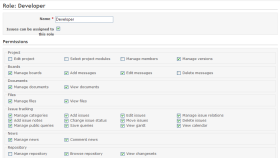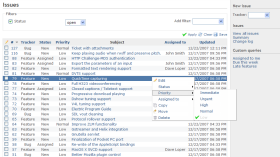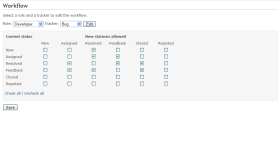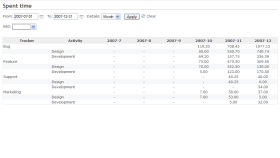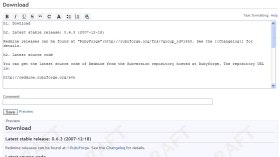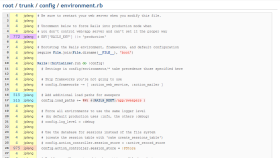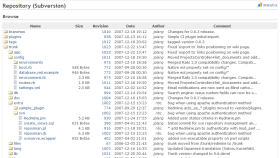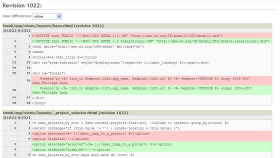Features » History » Revision 9
« Previous |
Revision 9/22
(diff)
| Next »
Jean-Philippe Lang, 2008-04-02 22:48
new translations
Main features¶
Multiple projects support
- Manage all your projects with one Redmine instance
- Each user can have a different role on each project
- Each project can be declared as public (visible by anyone) or private (visible by project members only)
- Modules (eg. wiki, repository, issue tracking, ...) can be enabled/disabled at project level
Flexible role based access control
- Define your own roles and set their permissions in a click
Flexible issue tracking system
- Define you own statuses and issue types
- Workflow transitions can be set up for each issue type and role through the web-based administration interface (a default configuration can be loaded when installing the application)
Gantt chart and calendar
- Automatic gantt and calendar based on issues start and due dates
Time tracking functionality
- Time can be entered at project or ticket level
- Simple report to view time per user, issue type, category or activity
Custom fields
- You can define your own custom fields for issues, projects and users
- Differents formats are available: text, date, integers, drop-down lists, checkboxes
- Custom fields can be displayed on the issue list and used as filters just like regular fields
News, documents & files management
- You can easily post messages and share files
Per project wiki and forums
- Wiki uses textile syntax and free linking within the wiki using brackets
- Diff and annotate views are available
Repository browser and diff viewer
- Existing repositories can be attached to each of your projects
- Redmine lets you browse their contents, view and search changesets
- Diff and annotate (aka blame) viewer
- Supported SCM: Subversion, CVS, Mercurial, Darcs and Bazaar
Feeds & email notifications
- Project activity, changesets, news, issues, issue changes are available as Atom feeds
Multiple LDAP authentication support
- Redmine lets you authenticate users against multiple LDAP
- Accounts can be created on-the-fly when a user is found in the directory (optional)
User self-registration support
- Optionnaly, you can allow users to register online
- 3 account activation methods are available: automatic (no confirmation required), manual (by administrators) or through an auto generated URL sent via email
Multilanguage support
Thanks to many contributors, Redmine is yet available in the following languages:
- Bulgarian
- Czech
- Danish
- Dutch
- English
- Finnish
- Chinese
- French
- German
- Hebrew
- Italian
- Japanese
- Lithuanian
- Korean
- Norvegian
- Polish
- Portuguese
- Romanian
- Russian
- Serbian
- Spanish
- Swedish
- Ukrainian
Multiple databases support
- Redmine runs with MySQL, PostgreSQL or SQLite
Feature requests¶
See the list of requested features.
Updated by Jean-Philippe Lang about 17 years ago · 9 revisions locked
